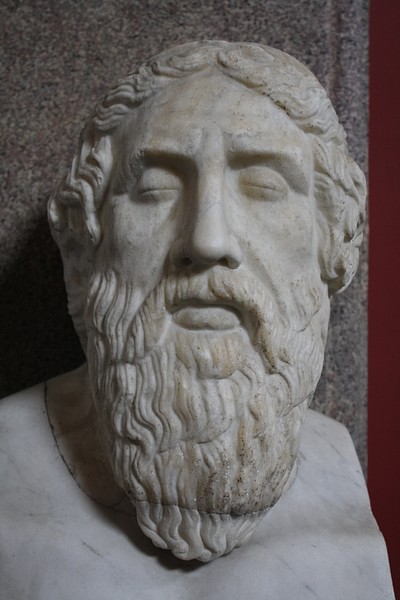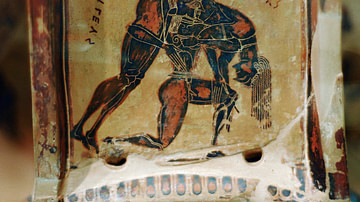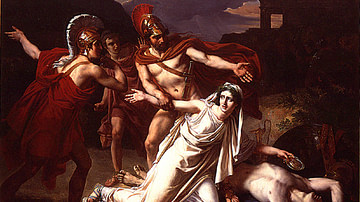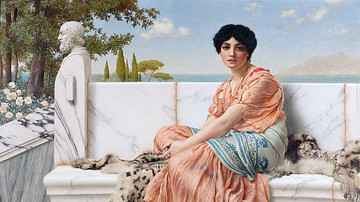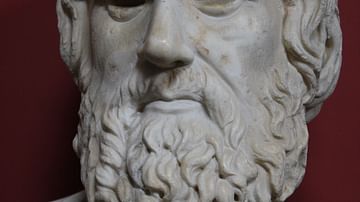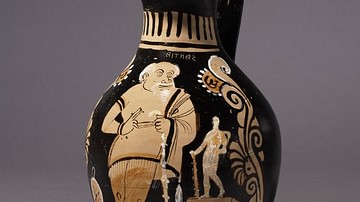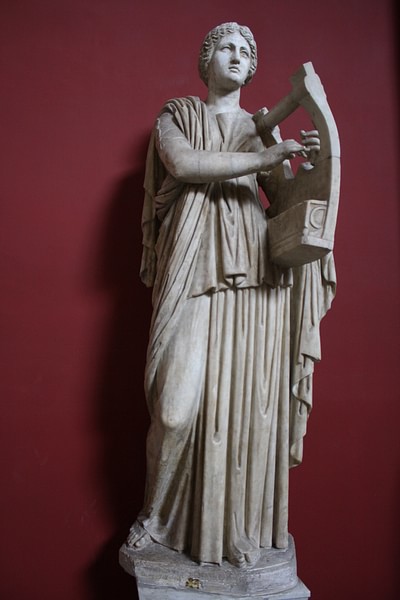
Greek literature has influenced not only its Roman neighbors to the west but also countless generations across the European continent. Greek writers are responsible for the introduction of such genres as poetry, tragedy, comedy, and western philosophy to the world. These Greeks authors were born not only on the soil of their native Greece but also in Asia Minor (Ionia), the islands of the Aegean, Sicily, and southern Italy.
Themes
The Greeks were a passionate people, and this zeal can be seen in their literature. They had a rich history of both war and peace, leaving an indelible imprint on the culture and people. Author and historian Edith Hamilton believed that the spirit of life abounds throughout Greek history. In her The Greek Way she wrote,
Greek literature is not done in gray or with a low palette. It is all black and shining white or black and scarlet and gold. The Greeks were keenly aware, terribly aware, of life's uncertainty and the imminence of death. Over and over again they emphasize the brevity and the failure of all human endeavor, the swift passing of all that is beautiful and joyful. [...] Joy and sorrow, exultation and tragedy, stand hand in hand in Greek literature, but there is no contradiction involved thereby. (26)
To fully understand and appreciate Greek literature one must separate it, divide the oral epics from the tragedies and comedies as well as the histories from the philosophies. Greek literature can also be divided into distinct periods: Archaic, Classical, and Hellenistic. The literature of the Archaic era mostly centered on myth; part history and part folklore. Homer's epics of the Iliad and the Odyssey and Hesiod's Theogony are significant examples of this period. Literary Greece begins with Homer. Since writing had not yet arrived in Greece, much of what was created in this period was communicated orally, only to be put in written form years later.
The Classical era (4th and 5th centuries BCE) centered on the tragedies of such writers as Sophocles and his Oedipus Rex, Euripides's Hippolytus, and the comedies of Aristophanes. Lastly, the final period, the Hellenistic era, saw Greek poetry, prose, and culture expand across the Mediterranean influencing such Roman writers as Horace, Ovid, and Virgil. Unfortunately, with only a few exceptions, much of what was created during the Archaic and Classical period remains only in fragments.
Archaic Period
During the Archaic period, the poets' works were spoken - an outcome of an oral tradition - delivered at festivals. A product of Greece's Dark Ages, Homer's epic the Iliad centered on the last days of the Trojan War, a war initiated by the love of a beautiful woman, Helen. It brought an array of heroes such as Achilles, Hector, and Paris to generations of Greek youth. It was a poem of contrasts: gods and mortals, divine and human, war and peace. Alexander the Great slept with a copy of the book under his pillow and even believed he was related to Achilles.
Homer's second work, the Odyssey, revolved around the ten-year “odyssey” of the Trojan War hero Odysseus and his attempt to return home. While most classicists and historians accept that Homer actually lived, there are some who propose his epics are the result of more than one author. Whether his or not, Homer's works would one day greatly influence the Roman author Virgil and his Aeneid. After Homer, lyric poetry - poetry to be sung - came into its own.
There were many others who ”wrote” during this period, among them were Aesop, Hesiod, and Sappho. The noted storyteller Aesop may or may not be the great fabulist of the ancient world. Professor and classicist D. L. Ashilman in his introduction to the book Aesop's Fables, wrote, "Aesop may not be a historical figure but rather a name that refers to a group of ancient storytellers." Convention claims that he was born a slave around 620 BCE in Asia Minor. After he received his freedom, he traveled throughout Greece collecting stories, including The Mischievous Dog, The Lion and the Mouse, and The Monkey as King. These stories often ended (not always happily) with a moral such as honesty is the best policy, look before you leap, heaven helps those who help themselves, and once bitten, twice shy. Written down years after his death, Aesop's fables were among the first printed works in vernacular English.
Another poet of the Archaic Period was Hesiod, the author of Theogony, a hymn to Apollo's Muses. He has been called the father of didactic poetry. Like Homer, little is known of his early life except that he came from Boeotia in central Greece. Theogony told of the origins and genealogies of the gods, the kingdom of Zeus. Hesiod wrote:
With the Heliconian Muses let us start
Our song: they hold the great and godly mount
of Helicon, and on their delicate feet
They dance around the darkly bubbling spring
And round the altar of the mighty Zeus. (23)
Later in the poem, he said:
Hail, daughters of Zeus
Give me sweet song
To celebrate the holy race of gods
Who live forever, sons of starry Heaven
And Earth, and gloomy Night, and salty Sea. (26)
His others works include Works and Days, The Shield of Herakles, and Catalogue of Women.
Lastly, one of the few female lyric poets of the period was Sappho, often called the tenth Muse. Born on the Aegean island of Lesbos, her poems were hymns to the gods and influenced such Romans poets as Horace, Catullus, and Ovid. Much of her poetry remains in fragments or quoted in the works of others.
Classical Period
Oral recitation of poetry, as well as lyric poetry, morphed into drama. The purpose of drama was to not only entertain but also to educate the Greek citizen, to explore a problem. Plays were performed in outdoor theaters and were usually part of a religious festival. Along with a chorus of singers to explain the action, there were actors, often three, who wore masks. Of the known Greek tragedians, there are only three for whom there are complete plays: Aeschylus, Sophocles, and Euripides. Oddly, these are considered among the great tragic writers of the world. Hamilton wrote:
The great tragic artists of the world are four, and three of them are Greek. It is in tragedy that the pre-eminence of the Greeks can be seen most clearly. Except for Shakespeare, the great three, Aeschylus, Sophocles, and Euripides stand alone. Tragedy is an achievement peculiarly Greek. They were the first to perceive it and they lifted it to its supreme height. (171)
Aeschylus (c. 525 - c. 456 BCE) was the earliest of the three. Born in Eleusis around 525/4 BCE, he fought at the Battle of Marathon against the Persian invaders. His first play was performed in 499 BCE. His surviving works include Persians, Seven Against Thebes, Suppliants (a play that beat out Sophocles in a competition), Prometheus Bound, Oresteia. Part of the Oresteia trilogy, his most famous work was probably Agamemnon, a play centering on the return of the Trojan War commander to his wife Clytemnestra, who would eventually kill him. After killing her husband she showed little remorse, she said
This duty is no concern of yours.
He fell by my hand,
by my hand he died, and by my hand
he will be buried, and nobody
in the house will weep. (99)
Most of Aeschylus's plays were centered on Greek myth, portraying the suffering of man and the justice of the gods. His works were among the first to have a dialogue between the play's characters.
Sophocles (c. 496 - c. 406 BCE) was the second of the great tragic playwrights. Of his 120 plays performed in competition, only 20 were victorious, losing far too many to Aeschylus. Only three of his seven surviving plays are complete. His most famous work, part of a trilogy, is Oedipus Rex or Oedipus the King, a play written 16 years after first of the three, Antigone, a play about Oedipus' daughter. The third in the series was Oedipus at Colonus, relaying the final days of the blinded king. The tragedy of Oedipus centered on a prophecy that foretold of a man who would kill the king (his father) and marry the queen (his mother). Unknowingly, that man was Oedipus. However, the tragedy of the play is not that he killed his father and married his mother but that he found out about it; it was an exploration of the tragic character of a now blinded hero.
The third great author of Greek tragedy was Euripides, an Athenian (c. 484 - 407 BCE). Unfortunately, his plays - often based on myth - were not very successful at the competitions; his critics often believe he was bitter about these losses. He was the author of 90 plays, among which are Hippolytus, Trojan Women, and Orestes. Euripides was known for introducing a second act to his plays, which were concerned with kings and rulers as well as disputes and dilemmas. He died shortly after traveling to Macedon where he was to write a play about the king's coronation. His play Medea speaks of a bitter woman who took revenge against her husband by killing her children. In pain Medea screams:
O great Themis and lady Artemis, do you see what I suffer, though I bound my accursed husband by weighty oaths? How I wish I might see him and his bride in utter ruin, house and all, for the wrongs they dare to inflict on me who never did them harm. (55)
Another playwright of the era was the Athenian author of Greek comedy, Aristophanes (c. 450? - c. 386 BCE). Author of Old Comedy, his plays were satires of public persons and affairs as well as candid political criticisms. Eleven of Aristophanes' plays have survived along with 32 titles and fragments of others. His plays include Knights, Lysistrata, Thesmophoriazusae, The Frogs, and The Clouds, a play that ridiculed the philosopher Socrates as a corrupt teacher of rhetoric. His actors often wore grotesque masks and told obscene jokes. Many of his plays had a moral or social lesson, poking fun at the literary and social life of Athens.
Greek philosophers & Historians
Among the major contributors to Greek literature were the philosophers, among them Plato, Aristotle, Epictetus, and Epicurus. One of the most influential Greek philosophers was Plato (427-347 BCE). As a student of Socrates, Plato's early works were a tribute to the life and death of his teacher: Apology, Crito, and Phaedo. He also wrote Symposium, a series of speeches at a dinner party. However, his most famous work was The Republic, a book on the nature and value of justice.
His student, Aristotle (384-322 BCE), disagreed with Plato on several issues, mainly the concept of empiricism, the idea that a person could rely on his/her senses for information. His many works include Nichomachean Ethics (a treatise on ethics and morality), Physics, and Poetics. He was the creator of the syllogism and a teacher of Alexander the Great.

A final group of contributors to ancient Greek literature are the historians: Herodotus, Thucydides, and Polybius. Both Herodotus (484 – 425 BCE) and Thucydides (460 – 400 BCE) wrote around the time of the Peloponnesian Wars. Although little is known of his early life, Herodotus wrote on both the wars between Athens and neighboring Sparta as well as the Persian Wars. During his lifetime, his home of Halicarnassus in western Asia Minor was under Persian control. Although he is often criticized for factual errors, his accounts relied on earlier works and documents. His narratives demonstrate an understanding of the human experience and unlike previous writers, he did not judge. He traveled extensively, even to Egypt.
His contemporary, Thucydides, was the author, although incomplete, of a History of the Peloponnesian War. Part of his history was written as it happened and looked at both long-range and short-range causes of the war. His massive unfinished work would be completed by such Greek authors as Xenophon and Cratippus.
Hellenistic Period
The Hellenistic period produced its share of poets, prose writers, and historians. Among them were Callimachus, his student Theocritus, Apollonius Rhodius, and the highly respected historian Plutarch. Unfortunately, like the previous eras, much of what was written remains only in fragments or quoted in the works of others.
The poet Callimachus (310 – 240 BCE) was originally from Cyrene but migrated to Egypt and spent most of his life in Alexandria, serving as a librarian under both Ptolemy II and III. Of his over 800 books, 6 hymns, and 60 epigrams, only fragments remain. His most famous work was Aetia (Causes), which revealed his fascination for the great Greek past, concentrating on many of the ancient myths as well as the old cults and festivals. His work heavily influenced the poetry of Catullus and Ovid's Metamorphoses.
His pupil Theocritus (315 – 250 BCE) originally from Syracuse also worked in the library at Alexandria, producing a number of works of which only 30 poems and 24 epigrams exist. He is said to be the originator of pastoral poetry. Like his teacher, his work influenced future Roman authors such as Ovid.
Apollonius Rhodius (born c. 295 BCE) was, like the others, from Alexandria, serving as both a librarian and tutor. Historians are unsure of the origin of the “Rhodius” attached to his name; some assume he lived for a time in Rhodes. His major work was the four books of the Argonautica, a retelling of the story of Jason's travels to retrieve the fabled Golden Fleece. And, like Callimachus and Theocritus, his work influenced Catullus and Virgil.
Besides poetry and prose, the best-known playwright of the era, the Athenian Menander (342 – 290 BCE), must be mentioned. Menander was a student of philosophy and leading proponent of New Comedy, authoring over 100 plays, including Dyscolus, Perikeiromene, and Epitrepontes. He was the master of suspense. His plays were later adapted by the Roman authors Plautus and Terence.
The Hellenistic world produced a few notable historians, too. Polybius (200 -118 BCE) was a Greek who wrote on Rome's rise to power. Denounced as too friendly to Rome, he was a proponent of Greek culture in Rome. Of his Histories, only the first five books remain of the 40 written.
Lastly, Plutarch (born c. 45 BCE) was one of the most famous of the Greek historians. Originally from Chaeronea, he was a philosopher, teacher, and biographer. Although he spent time in Egypt and Rome (where he taught philosophy), he spent most of his life in his home city. Later in life, he served as a priest at the oracle at Delphi. His most famous work Parallel Lives provided biographies of Roman statesmen as well as such Greeks as Alexander, Lycurgus, Themistocles, and Pericles. Unlike other histories, he chose not to write a continuous history but concentrated on the personal character of each individual. He also wrote on ethical, religious, political, and literary topics of the day.
Legacy
After the death of Alexander the Great and the growth of Hellenistic culture across the Mediterranean, Roman literature and art had a distinctive Greek flavor. Greek literature had risen from the oral tradition of Homer and Hesiod through the plays of Sophocles and Aristophanes and now lay on the tables of Roman citizens and authors. This literature included the philosophy of Plato and Aristotle and the histories of Herodotus and Thucydides. Centuries of poetry and prose have come down through the generations, influencing the Romans as well as countless others across Europe. Referring to the “fire” of Greek poetry, Edith Hamilton wrote, "One might quote all the Greek poems there are, even when they are tragedies. Every one of them shows the fire of life burning high. Never a Greek poet that did not warm both hands at that flame." (26) Today, libraries both public and private contain the works of those ancient Greeks. And, countless future generations will be able to read and enjoy the beauty of Greek literature.

